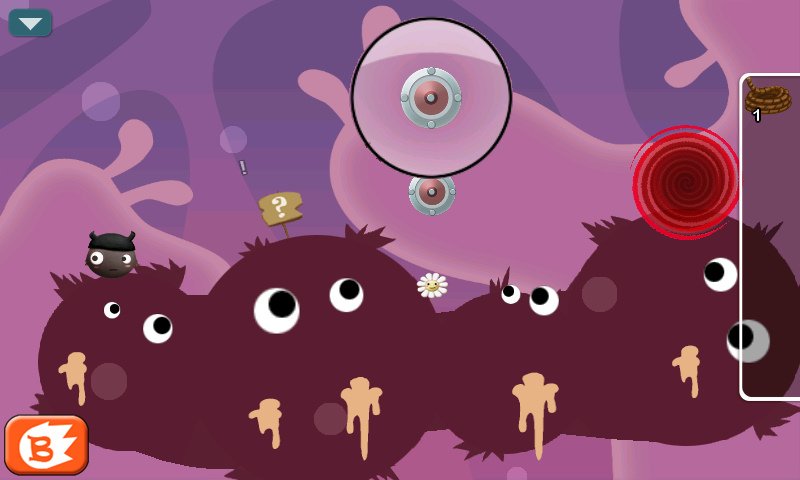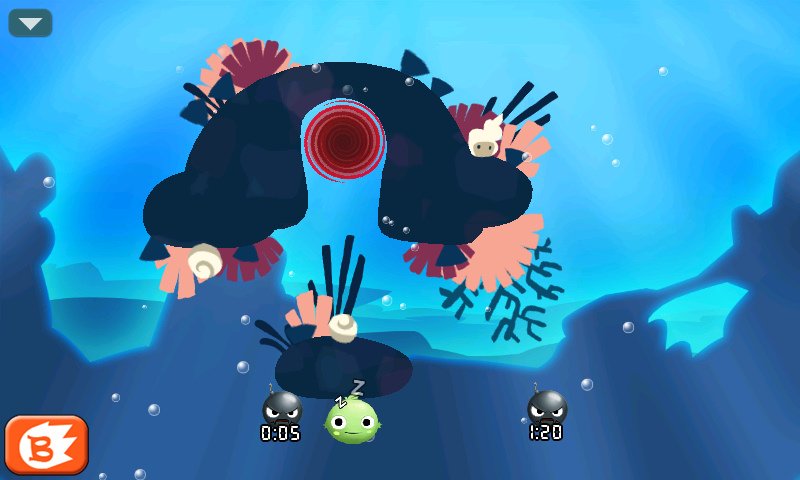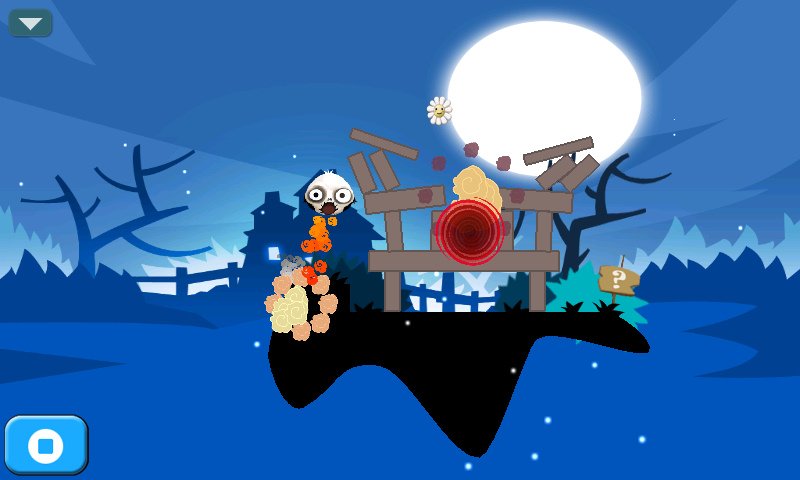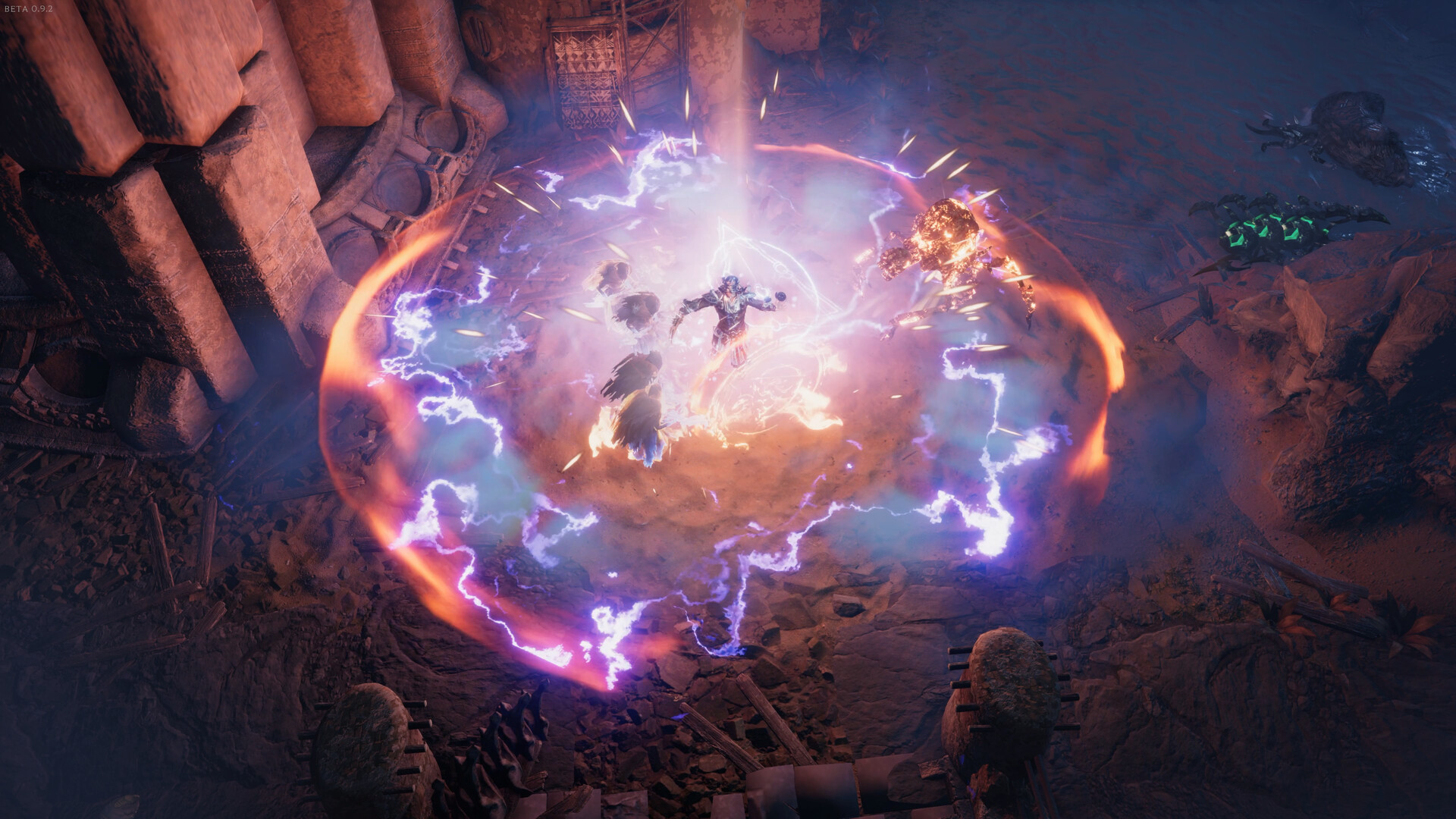iBlast Moki - Review

The runaway success of Angry Birds is proof that physics-based puzzlers are a great match for mobile devices. Lots of short levels and cute characters are the key. iBlast Moki, an Xbox Live title from Godzilab Games is another high-quality game that uses physics for its puzzles. Its bright, endearing graphics and simple controls belie the game’s surprising depth and challenge.
The first thing gamers will notice about iBlast Moki is the Mokis themselves. Seemingly inspired by the PSP game Loco Roco’s character designs, Mokis are little balls with smiling faces. They display a lot of personality for body-less characters, peering around everywhere, taking naps, and looking rather surprised as they get tossed around each level.
Roll past the jump for our full review.
Bombs away!

The goal of every level is to somehow get one or more Mokis into the level’s exit. Initially, this just involves planting bombs to blast the little guys in the desired direction. There is no time limit during the setup process. When you’re ready to try out the solution, just press the start button in the corner of the screen and see if it works. Fail and you can instantly restart the stage and try again.
As the level complexity increases, chain reactions and timing come into play. Bombs have adjustable timers to facilitate such reactions. The game shows you which way the first bomb in a level will knock a Moki, but to aim subsequent bombs you’ll need to use observation and plenty of trial-and-error. Stages often have a specific solution to discover, though there are sometimes faster and less obvious ways of reaching a goal. Better times (the time between pressing start and all Mokis reaching the exit) equal higher scores on the friends Leaderboards, plus they tie into several Achievements.
If you build it...

Just when players think they’re getting to master iBlast Moki’s bombing and puzzle mechanics, the second half of the game throws several new items into the mix: balloons, ropes, iron bars, wheels, and screws. Like bombs, each stage only grants a specific number of these items to work with. Attach a balloon and rope to a Moki or another item and it will float. Iron bars and ropes make for great bridges. Wheels can be attached to bars or other objects in the level to make carts and bulldozers. It’s a lot to deal with, but they’re introduced gradually enough, and many stages display text hints to nudge the player along.
Lots to do

iBlast Moki has six distinct worlds containing several levels each, for a total of 70 stages. The final stages of most worlds end with a boss encounter. These involve getting a giant Moki into the goal in addition to one or more standard Mokis. 70 stages may not seem like a lot compared to Angry Birds’ approximately 17 bajillion levels, but iBlast’s stages are considerably more complicated and challenging. It took me a good while to reach the end of this game.
Get the Windows Central Newsletter
All the latest news, reviews, and guides for Windows and Xbox diehards.
Brain benders

Part of my ample playtime came from 8 or so stages that I just couldn’t solve. There lays the problem with this type of puzzle game: when you’re stumped, you’re stumped. There are so many possible things to try; it could take hours to finish just one tough level. Sure, some (not all) stages have help signs, but the tips are often too vague to be of much use. I wish the game had a proper hint system to show players what to do, perhaps at the expense of score. As it stands, perplexed players must look to YouTube videos or forum threads for guidance.
A few more nitpicks

Difficulty issues aside, iBlast Moki has some more minor problems. Its controls are simple and usually intuitive: drag a bomb from the menu on the side of the screen to the playfield, and optionally rotate the bomb’s cursor to adjust its timer. Sometimes, though, when I tried to move a bomb I would accidentally adjust the timer and vice-versa. This could have been avoided by adding a button to toggle between location and timer adjustment, though perhaps that would have complicated the interface too much for the casual crowd. Adjusting the length of ropes and iron bars was also pretty inconsistent – I often ended up dragging the item when I meant to adjust its length.
As regular Windows Phone Central readers probably know, one of my pet peeves in mobile games is the music. Phone games frequently just don’t have enough music tracks to match their length. iBlast Moki’s songs do come up short – both tracks are fine for a bit, but by the end of the game they had repeated way too often. On the bright side, I hear iBlast Moki 2 will have much better music. Let’s hope it shows up on Xbox Live as well.
Achievements

iBlast Moki’s Achievements primarily revolve around completing each world, beating the boss stages, and earning Gold medals on every world. To get a gold medal on a stage, the player must complete it within a certain amount of time. Some levels also require the Mokis to collect floating flowers on their way to the goals in order to win the gold.
On the plus side, the game saves your exact item placement and timing on every single stage. Thus it’s easy to go back and tweak your setup for a better time and score. I also like that there are gold medal Achievements for each world instead of just one for getting golds in all worlds, which creates a better sense of progress. Rounding out the Achievements are three gimmes for causing Mokis to move quickly – everyone should get those on the first few levels.
Overall impression
iBlast Moki is the first physics puzzler I played on Windows Phone 7, and it’s a good one. The colorful characters, simple interface, and interesting puzzles kept me both smiling and thinking throughout. Occasional frustrating levels threatened to derail the experience, but I’m not above searching for help when I need it. If you’ve played Angry Birds and are looking for something more challenging, iBlast Moki should fit the bill.
- iBlast Moki - Windows Phone 7 or 8 - 15 MB - $2.99 - Store Link

Paul Acevedo is the Games Editor at Windows Central. A lifelong gamer, he has written about videogames for over 15 years and reviewed over 350 games for our site. Follow him on Twitter @PaulRAcevedo. Don’t hate. Appreciate!

